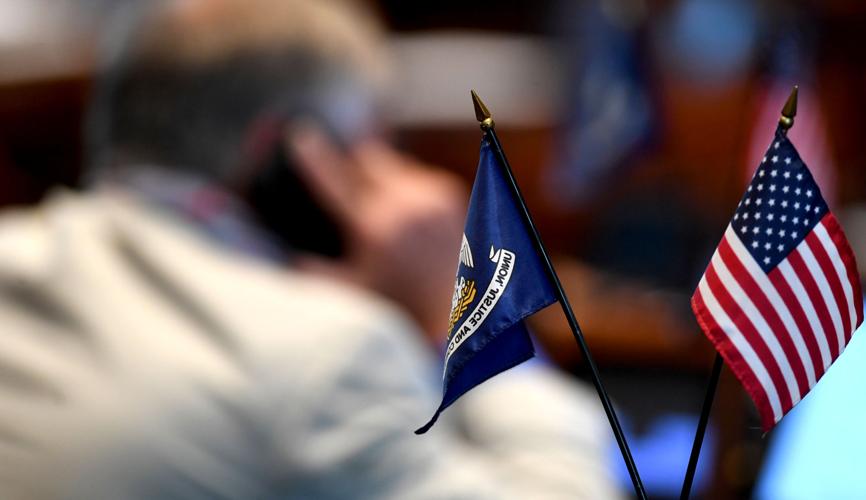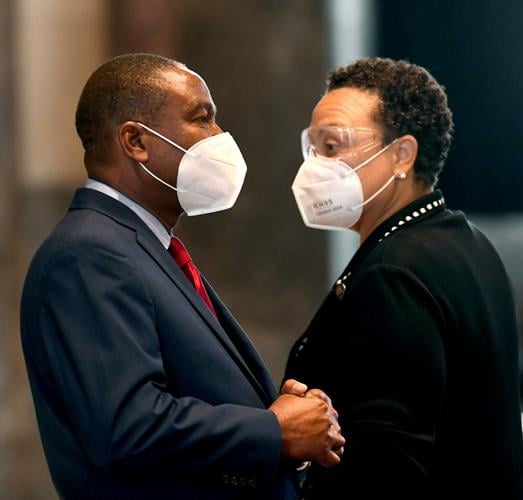The coronavirus pandemic has caused more confusion and uncertainty than just about anyone can remember.
But one clear picture has emerged in the State Capitol: lawmakers in the two parties are offering sharply divergent prescriptions to revive the battered and bruised economy.
Republicans are focusing on using the levers of government to directly aid businesses.
“The best way to help people is for them to have a job where they can support their family. By helping small businesses, we’re putting people back to work,” said state Sen. Sharon Hewitt, of Slidell, summing up the Republican view.
Democrats want to help unemployed workers and send money to workers who earn less than $50,000 a year.
Republicans “have been really focusing on folks who have had a really tough two months instead of folks who have a really tough life,” said state Rep. Ted James, D-Baton Rouge. “Businesses can’t flourish if the employees are not healthy.”
The different approaches have played out during the regular legislative session that ended on June 1 and during the 30-day special session that immediately followed. It will end Tuesday at 6 p.m.
Lawmakers still have to pass an annual budget that would allow state government to spend money on countless activities during the fiscal year that begins July 1. The legislators are also going down to the wire on the biggest fight this year – over whether to limit payments to car accident victims and their lawyers, with the claim by supporters that the move will lower the state’s high car insurance rates. Gov. John Bel Edwards vetoed the major bill passed during the regular session, forcing conservative lawmakers to try again during the special session.
But more than anything else, how to keep alive and then resuscitate the collapsed economy has dominated proceedings in Baton Rouge since lawmakers resumed work on May 4 after a six-week hiatus caused by the coronavirus.
What’s not in dispute is that Louisiana is suffering through the worst economy in at least 50 years, and perhaps since the Great Depression during the 1930s.
Figures released Friday provided a snapshot of the problem: personal income nationwide was 8.6% percent lower in May than in February.
The number of people working in Louisiana in April was 1,722,000, or about 275,000 fewer than in the pre-pandemic month of February, said Gary Wagner, an economics professor at the University of Louisiana at Lafayette.
“It looks like not until the second half of 2022 at the earliest will Louisiana’s economy return to where we were in February 2020,” he said.
After the pandemic forced Edwards to shut down Louisiana’s economy in March, tens of thousands of workers lost their jobs, and sales evaporated for businesses throughout the state.
The federal government stepped in with a lifeline for states by passing the CARES Act on March 27. It provided $1 billion to help Louisiana balance its budget while making minimal spending cuts, gave hundreds of millions of dollars in forgivable loans to businesses to help them remain afloat, and provided hundreds of millions of dollars to jobless workers to allow them to buy food and pay rent and other monthly bills.
State lawmakers, with fewer tools at their disposal, have tried to do their part, and this has revealed the clear divide between Republicans and Democrats.
Republicans have sought and will likely pass tax breaks for specific industries.
The GOP members also pushed through the Legislature a measure that will provide $300 million to businesses. But attempts to provide huge giveaways to oil and gas companies and to corporations across the board foundered because the cost to the state treasury was too high.
Republican senators are attempting to stop, at least temporarily, a pay raise of about $1,400 for 38,000 state employees who earn an average of $47,000 per year, according to figures from State Civil Service.
Democrats have failed in efforts to make more people eligible for unemployment benefits, but are on the verge of winning final legislative approval to provide a one-time $250 payment to front-line workers during the early days of the pandemic who earn less than $50,000. The payments will cost the treasury $50 million.
Republican lawmakers are sponsoring an array of tax breaks that likely will pass both the House and the Senate. Beneficiaries would be investors that restore historic structures, as well as others who buy and sell those tax credits; retailers, hotels and restaurants that would now be eligible for certain tax credits; and businesses that collect sales taxes.
The Legislature already has approved a tax cut for the state’s 20 gambling halls, which is projected to cost the treasury $83 million over the next five years without a requirement that the casino owners invest more money or create jobs. Edwards still has to decide whether to sign the measure, Senate Bill 5, sponsored by state Sen. Ronnie Johns, R-Lake Charles.
Another clear indication of the Republican philosophy came with the debate over $811 million that the federal government gave to the state to reimburse local governments for coronavirus-related costs.
State Sen. Heather Cloud, R-Turkey Creek, and state Rep. Jerome Zeringue, R-Houma, won legislative approval to carve out $300 million for small businesses in a program to be administered by state Treasurer John Schroder, a Republican, not Edwards. The governor and many other Democrats raised objections, but he signed the measure into law.
No business that qualifies for the money will receive more than $15,000.
Hewitt explained why she favored giving the money to small businesses rather than local governments.
“You can help people in the short term by giving them a government check,” she said. “You help them in the long term by giving them a job.”
During the regular session, Democrats sponsored measures that would have expanded sick leave for workers and given greater protection to renters facing eviction now. Republicans killed those bills during committee hearings.
Workers and unemployed workers especially need help now, said Jan Moller, director of the Louisiana Budget Project, a left-leaning Baton Rouge nonprofit that favors higher spending on education and health care.
“A huge number of people in the state are one missed paycheck away from needing help to put food on the table,” Moller said.
The differing approaches between Republicans and Democrats played out Thursday at the House Labor and Industrial Relations Committee.
James offered a resolution to have the Louisiana Workforce Commission study whether lawmakers ought to authorize a higher weekly state benefit to jobless workers than the current maximum of $247.
Before COVID-19, only 11% of unemployed workers in Louisiana qualified for unemployment benefits, which ranked Louisiana 46th among the 50 states, according to the Center on Budget and Policy Priorities, a liberal nonprofit based in Washington, D.C.
The group also said that jobless workers in Louisiana earn just 23% of what they were making, which ranks the state dead last among the 50 states in the average weekly benefit it pays as a share of average weekly wages.
State Rep. Larry Frieman, R-Abita Springs, objected to James’ resolution, noting that a tax on businesses pays for jobless payments.
Expanding unemployment benefits, Frieman said, “is going to cost businesses more. While our people are suffering, our businesses are suffering, too. This is a dangerous slope.”
The Republican majority on the committee defeated James’ House Resolution 47.
James then offered House Resolution 48, which would call on Congress to expand the $600 weekly benefit to unemployed workers that was part of the CARES Act but that will expire on July 31. Combined with the state benefit, this provision has lifted the maximum payment for jobless workers in Louisiana to $847 a week. That equals about $20 per hour, more than low-wage workers earned while employed.
Keeping the money flowing is good for the economy, said Peter Robins-Brown, communications director for the Power Coalition for Equity and Justice, a New Orleans-based nonprofit that advocates for the poor. “Businesses aren’t going to be able to open, stay open and thrive if no one has any money to spend,” he said.
Republicans objected again.
“I’m not sure this sends the right message,” said state Rep. Alan Seabaugh, R-Shreveport. “I don’t think keeping people on unemployment is the answer. I think reopening the economy, reopening businesses, getting people back to work is the answer.”
State Rep. Blake Miguez, R-Erath, said the $600 weekly benefit is so generous that it encourages some workers to remain jobless.
Seabaugh, Miguez and their Republican colleagues killed this resolution as well.
Wagner said that having Congress extend the $600 weekly unemployment payments would benefit the economy overall. He noted that unemployment insurance benefits accounted for an exceptionally high 14.6% of wage and salary income nationally in May, compared to less than 0.5% during normal times.
“The consensus among the economics profession is that you want to provide more of an income safety net at this time,” Wagner said, adding that research has shown that only a small percentage of jobless workers generally prefer to collect unemployment payments rather than work.
Besides, he added, “If somebody wanted to enter the labor force, it’s not clear there is a job for them.”








